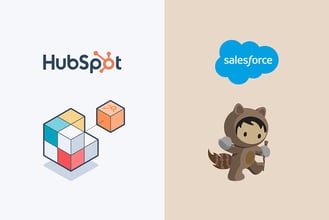Table of contents
If you've considered HubSpot as your RevOps platform, you may have seen several HubSpot integrations and APIs. If not, now is a great time to get familiar as you chart a course for accelerating your revenue. The truth is, that several research studies show a positive impact on businesses over the years, with recent innovations bringing more success and ease of use to the platform's usability.
According to HubSpot's internal study on customer ROI, HubSpot customers have seen 2.1X more visitors per month within one year, 2.5X more leads per month within a year, and 70% of customers saw an increase in lead-to-customer conversion rate. With that being said, revenue operations (RevOps) are also making a big difference for businesses, and the two combined are maximizing marketing, sales, customer service, and revenue potential.
Why are integrations important for a RevOps platform?
A RevOps platform allows your business to align all of your marketing, sales, and customer success plans and executions with a single shared goal and purpose. It brings all department teams together under a unified approach to maximize revenue through a more in-depth understanding of your customers and their customer lifecycle while minimizing cost and expenses by updating tools, strategies, and practices.
Integrations are so important because they add more value and functionality to your platform, allowing your teams to have access to a wider range of tools and apps that will help your business reach its goals. HubSpot integrations expand your opportunities by allowing data to be transferred between the different, and sometimes disjoint, department tools. For instance, the HubSpot/Salesforce integrations enable more consistency and unity between your marketing and sales teams.
How HubSpot APIs are used for integrations
An application programming interface, better known as an API, is essentially a series of connections between a website, app, and/or service and the user (you). In fact, HubSpot defines them as "an information middleman [that] allows for an application to extract information from a piece of software and use that information in their own application, or sometimes for data analysis."
The importance of APIs is simple — absolutely everything you do on the internet is connected to an API that talks between services to provide you with the best experience possible. HubSpot's APIs are designed to help you form strong integrations and customize your platform to fit your business needs and goals.
Since it's so important in a RevOps strategy to keep your marketing, sales, and customer success teams aligned, HubSpot's APIs can be incredibly helpful in quickly and easily integrating your apps and tools required for every department's progress towards a shared goal — meaning all your apps and tools can 'talk' between each other and keep your teams unified.
Why APIs are the key to the scalability of any platform
Much like how different forms of education and experience can help you scale your professional skills, APIs act as the key components for platform scalability. Essentially, the more you know — the better your skills. Likewise, APIs increase the efficiency and ease of data transfers between your most important apps and tools on a platform.
So, why are APIs the key to the scalability of any platform? It's simple. Without them, your departments are forced to work overtime in communicating and aligning tactics, goals, etc., under RevOps. With them, RevOps is made easier by providing everyone with access to the same important data and tools without putting strain on employees to source through it all and bring it together. Result: APIs make the process quick and easy.
How the Operations Hub enables seamless integrations
HubSpot's recent expansion launch for Operations Hub has created a more seamless and unified experience with customized HubSpot integrations. The new addition makes seamless integrations possible by syncing data from all your integrated apps and tools — merging consumer data from all your departments and organizing it into one centralized source. This keeps all your teams on the same page and working as efficiently as possible.
Some important integrations include:
- • Analytics & Data: Databox, Klipfolio
- • Connector Integrations: Zapier, Automate.io
- • Customer Success: Zendesk, Live Chat, Slack
- • Sales Enablement: Salesforce, PandaDoc
Building custom HubSpot integrations with APIs
While you can't technically integrate with any tool/app on the market with HubSpot, they have had some incredible partnerships over the years that will allow you to have access to a strong range of marketing, sales, and customer success software and applications. In fact, their APIs enable you to build customized integrations that best fit your business specifically — after all, no two businesses are completely alike.
How to build your custom integration in HubSpot:
- Have a business account with HubSpot.
- Obtain a HubSpot API key to access advanced features, import/export data, and sync accounts to various tools.
- Update/add API keys as needed and view them in your call log.
In a world of rapid progression, innovations, and technology can be intimidating for many businesses. It can also get complex and overwhelming at times. Fortunately, there are things like HubSpot's integration and API capabilities to help you succeed and grow with your RevOps strategy. Reach out to us at Learners.ai, a trusted HubSpot integration partner, today if you need help to reduce the complexity in your tech stack and ensure that your platform scales seamlessly as your business grows.



